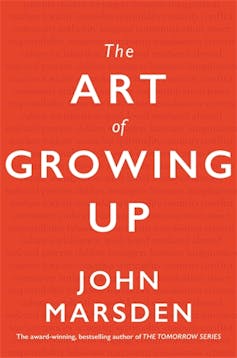John Marsden says parents and schools are failing kids, but his book offers little evidence
- Written by Mandie Shean, Lecturer, School of Education, Edith Cowan University
There is cause for concern for Australia’s young people with figures indicating they are experiencing the highest levels of anxiety and stress, and suicide than ever before.
Writer and teacher John Marsden says poor youth outcomes are from toxic parenting and ineffective schools.
Read more: Teenagers who play sport after school are only 7 minutes more active per day than those who don't
That’s the key premise of his new book The Art of Growing Up, his manifesto for growing up in the 21st century based on his experience in schools as a teacher and principal.
Blame the parents
In the book, Marsden writes:
[…] we are seeing an epidemic in damaging parenting at the moment.
His key criticisms are that parents are too controlling or too lax, children are overindulged, overprotected and overpraised.
 John Marsden shares his views on schools and parents in his new book The Art of Growing Up.
Pan Macmillan
John Marsden shares his views on schools and parents in his new book The Art of Growing Up.
Pan Macmillan
Marsden is correct in saying lax or controlling parenting leads to negative outcomes in young people. Research shows adolescents are better if parents are authoritative rather than authoritarian or permissive.
But when providing advice, Marsden is contradictory in how parents should reach this ideal version of parenting. He criticises parents for setting rules and telling children what to do, and then says parents should say “no” more often and “mature adults must be in charge”.
It is difficult to imagine how parents can be in charge if they do not have any rules to “say no to”. While I think his intention was to critique meaningless and excessive rules, and encourage parent authority, the message for parents is left unclear.
Overprotective parents
Another concern of Marsden is the helicopter or curling parent – the one that hovers over the child checking their path is clear for success.
This is also called overparenting, whereby parents try to manage the emotions of children and adolescents, provide too much advice, and overprotect. There is evidence overparenting leads to negative outcomes for young people, including increased feelings of entitlement and anxiety for children and adolescence that can persist in adulthood.
 Pan Macmillan
Marsden is correct in suggesting normal challenge is good for young people, and therefore saving them from it is not helping them. Resilience comes from brief exposure to challenges, not the avoidance of them.
Overprotective parents subvert this process and in turn young people do not develop their own skills to face challenge, as they are reliant on their parents.
Marsden also believes overprotective parents protect children from the experience of negative emotions, believe their children are perfect and “special”, and that “these inner kids don’t throw a shadow”.
All emotions are important for healthy development. Happiness, as Marsden writes, is relative. We only experience happiness when we know what unhappiness is.
While anecdotes can be powerful, Marsden does not provide evidence these parenting practices have increased.
Ineffective schools
Marsden says many truths about what is required for schools to be effective – ideas like partaking in real experiences, allowing boredom, giving children agency, and developing belonging and community in schools.
These ideas are all evident in research and none are new, but possibly they have been forgotten or relegated to “old fashioned” and therefore not relevant.
For example, the state of boredom (not trait) indicates a need to self-regulate and change. If parents or schools try to eliminate boredom in young people by overscheduling or over entertaining then they have become responsible for the self-regulation not the child.
Boredom produces a level of emotional discomfort, but as Marsden is trying to suggest, that does not mean adults need to schedule it away.
Marsden’s comment that most bullying can be prompted by “unlikeable behaviours” of the victim appears to have gained the greatest traction, but it is a minor point in the book.
Marsden is only suggesting children self-reflect on their role in interactions, and this is a useful behaviour for all humans.
Accurately reflecting on our own behaviours is a powerful foundation for change. The problem, as with many of the statements made in the book, it lacks context.
Hidden truths
The numerous contradictions, absolutes and lack of evidence across the book hide some of the truths Marsden has rightfully identified in his experience.
While I don’t negate the importance of our own experience in informing our understandings, experience tends be biased and defined by our own context. Perhaps Marsden is trying to sensationalise some ideas to awaken us. It has certainly started a conversation.
One of these contradictions is his statement that adolescents are more compassionate, empathetic and aware in the 21st Century. Shouldn’t that mean parents and schools are doing a great job?
Read more:
One-third of all preschool centres could be without a trained teacher in four years, if we do nothing
He also says Australian schools have made improvements in creativity, emotional intelligence, and social intelligence among other gains. Again, there is no research to support this and if this is the case, it contradicts his statement that “schools are still sitting in the driveway, belching out toxic gas”.
What concerns me most is statements like “the emptiness inside damaged children was so vast that nothing, nothing, could fill it” because it implies there’s no recovery from trauma and that toxic parents are responsible for all negative outcomes in young people.
These absolutes can keep people stuck where they are. Parents need support from the community, not further accusations from professionals and academics. While Marsden does not believe the assumption “all parents have their [kids’] best interests at heart”, I do.
Pan Macmillan
Marsden is correct in suggesting normal challenge is good for young people, and therefore saving them from it is not helping them. Resilience comes from brief exposure to challenges, not the avoidance of them.
Overprotective parents subvert this process and in turn young people do not develop their own skills to face challenge, as they are reliant on their parents.
Marsden also believes overprotective parents protect children from the experience of negative emotions, believe their children are perfect and “special”, and that “these inner kids don’t throw a shadow”.
All emotions are important for healthy development. Happiness, as Marsden writes, is relative. We only experience happiness when we know what unhappiness is.
While anecdotes can be powerful, Marsden does not provide evidence these parenting practices have increased.
Ineffective schools
Marsden says many truths about what is required for schools to be effective – ideas like partaking in real experiences, allowing boredom, giving children agency, and developing belonging and community in schools.
These ideas are all evident in research and none are new, but possibly they have been forgotten or relegated to “old fashioned” and therefore not relevant.
For example, the state of boredom (not trait) indicates a need to self-regulate and change. If parents or schools try to eliminate boredom in young people by overscheduling or over entertaining then they have become responsible for the self-regulation not the child.
Boredom produces a level of emotional discomfort, but as Marsden is trying to suggest, that does not mean adults need to schedule it away.
Marsden’s comment that most bullying can be prompted by “unlikeable behaviours” of the victim appears to have gained the greatest traction, but it is a minor point in the book.
Marsden is only suggesting children self-reflect on their role in interactions, and this is a useful behaviour for all humans.
Accurately reflecting on our own behaviours is a powerful foundation for change. The problem, as with many of the statements made in the book, it lacks context.
Hidden truths
The numerous contradictions, absolutes and lack of evidence across the book hide some of the truths Marsden has rightfully identified in his experience.
While I don’t negate the importance of our own experience in informing our understandings, experience tends be biased and defined by our own context. Perhaps Marsden is trying to sensationalise some ideas to awaken us. It has certainly started a conversation.
One of these contradictions is his statement that adolescents are more compassionate, empathetic and aware in the 21st Century. Shouldn’t that mean parents and schools are doing a great job?
Read more:
One-third of all preschool centres could be without a trained teacher in four years, if we do nothing
He also says Australian schools have made improvements in creativity, emotional intelligence, and social intelligence among other gains. Again, there is no research to support this and if this is the case, it contradicts his statement that “schools are still sitting in the driveway, belching out toxic gas”.
What concerns me most is statements like “the emptiness inside damaged children was so vast that nothing, nothing, could fill it” because it implies there’s no recovery from trauma and that toxic parents are responsible for all negative outcomes in young people.
These absolutes can keep people stuck where they are. Parents need support from the community, not further accusations from professionals and academics. While Marsden does not believe the assumption “all parents have their [kids’] best interests at heart”, I do.
Authors: Mandie Shean, Lecturer, School of Education, Edith Cowan University



















